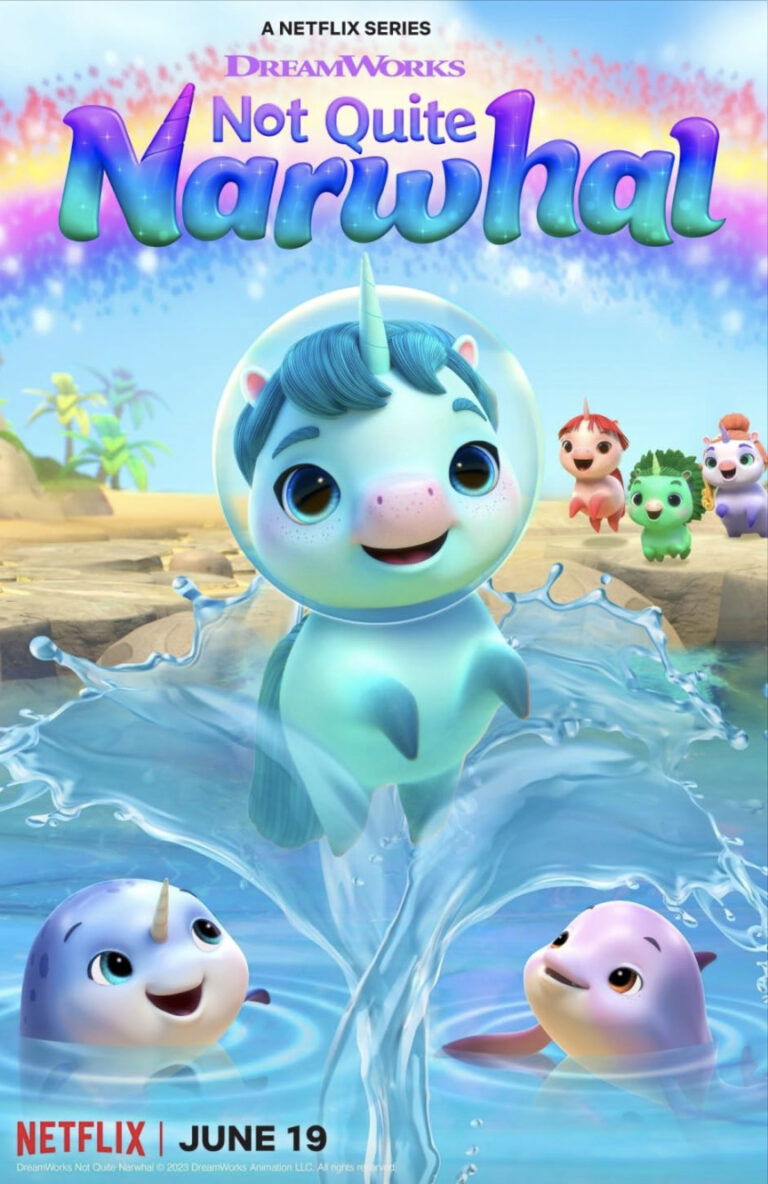“Not Quite Family Friendly”

| None | Light | Moderate | Heavy | |
|---|---|---|---|---|
| Language | ||||
| Violence | ||||
| Sex | ||||
| Nudity |
What You Need To Know:
The first three episodes of NOT QUITE NARWHAL are well produced and engaging for preschool children. All the conflict revolves around Kelp’s struggles to adjust to unicorn life. No characters are presented as doing wrong, and both Kelp’s whale family and his unicorn friends are loving and supportive. The content in the first three episodes is wholesome and family friendly, but unicorn fantasy magic is used in the episodes. Also, the exploration of identity in NOT QUITE NARWHAL stems from an unbiblical ideology of gender identity.
Content:
Strong Romantic worldview where the primary theme revolves around identity and self-discovery, so the exploration of identity can be read as politically correct gender identity in certain scenes, mitigated by strong moral elements stressing individuality, acceptance, friendship, and family, plus there’s some fantasy unicorn magic;
No foul language;
No violence;
No sex;
No nudity;
No alcohol use;
No smoking or drugs; and,
Nothing else objectionable.
More Detail:
Episode 1 follows Kelp, a young unicorn raised by a Narwhal family. One day, he gets lost while playing with his whale sister and finds himself on an island of unicorns. He meets more unicorns, Pixie and her sister, Juniper, and they take him to their world. Kelp returns to his whale family to tell them he is a unicorn, and they greet the news with acceptance. In Episode 2, Kelp goes back to the unicorn world. His friends teach him about being a unicorn, but Kelp struggles to learn magic. He unlocks a new magic river by dancing with his friends. In Episode 3, Kelp is introduced to tacos. Through trial and error, he learns how to bring them to his whale family without getting them wet.
Kelp’s friends often affirm his individuality by praising his unique abilities, like his dancing skills or ability to blow bubbles out of his horn. In Episode 2, Juniper initially pesters Kelp with questions, and Pixie rebukes her for bothering him. Juniper says she’s only curious because Kelp is so interesting. Kelp asks Pixie what the sky is, and she laughs, misinterpreting the question as a joke, but compliments his humor. When Kelp fails to use his unicorn magic to make a rainbow from his horn, he comforts himself by dancing and coincidentally creates a rainbow river with his friends. Pixie affirms that he made a rainbow his own way. Even though the characters recognize Kelp is different, they are all very kind and accepting.
Judging by the first three episodes, NOT QUITE NARWHAL is well produced and engaging for preschool audiences. The entertainment quality is geared toward younger children, so older audiences won’t find the series as entertaining. All conflict revolves around Kelp struggling to adjust to unicorn life. Unicorn fantasy “magic” is throughout the first three episodes. The content in the first three episodes is wholesome, clean and family friendly, but the underlying themes of identity and acceptance come from a liberal, leftist ideology that alludes to gender identity.
Parents should be advised that the original book has been praised by the LGBTQ community (with which the self-identified “non-binary” author, Jessie Sima, identifies) for its exploration of identity and acceptance. While the book and the series don’t have any references to sexuality or transgenderism, the themes in NOT QUITE NARWHAL support that ideology. Viewers could interpret most of the show’s messaging as a commentary on adoption, but the final scene of the first episode contains some gender identity subtext.
Thus, when Kelp goes to tell his narwhal parents about his discovery of his unicorn identity, he’s initially nervous about how his family will react. Upon telling them, they respond very positively. He then asks, “What am I? Am I a land narwhal or a sea unicorn,” and his whale father replies, “Do you have to choose?” Kelp’s conclusion is that he’s satisfied being himself, identifying as both. The subtext leans toward gender identity, even without explicit references to sexuality. In Episode 2, Kelp fully accepts his identity as a unicorn, and no more subtextual references are made for the following two episodes. The opening intro says Kelp is “not quite ocean, not quite land, but I go with the flow and know who I am,” which further alludes to the self-acceptance foundational to the gender fluidity concept. Parents should be aware of this influence and exercise caution before showing NOT QUITE NARWHAL to children.
MOVIEGUIDE® advises extreme caution for the identity themes in NOT QUITE NARWHAL.


 - Content:
- Content: 

